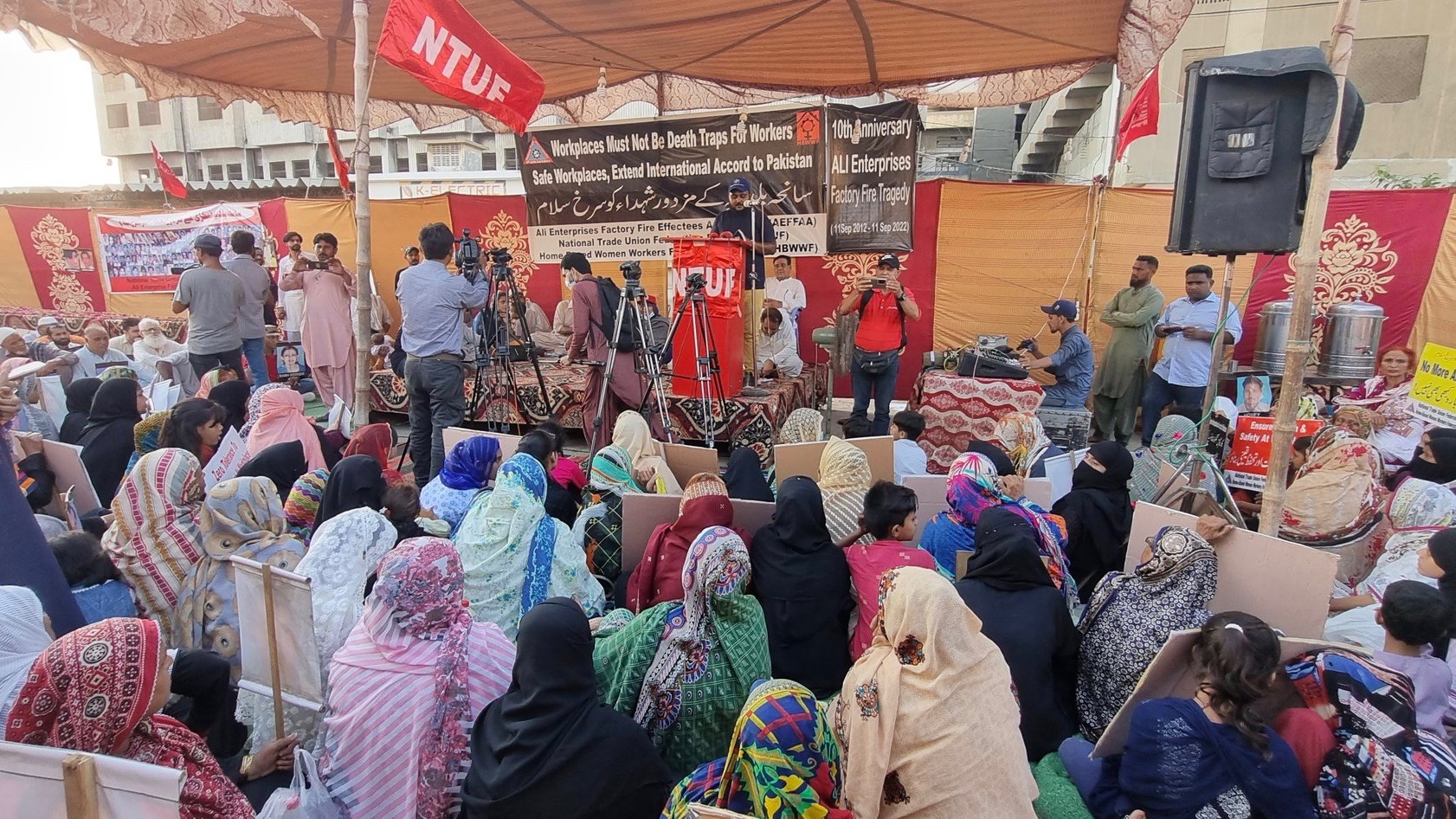On the tenth anniversary of the industrial fire that killed at least 260 workers in a garment factory in Pakistan, scores of political workers, rights activists, and family members of the deceased carried out a rally and sit-in protest outside the site of the factory in Karachi’s Baldia town on September 11.
The rally was organized by the Association of the Affectees of Baldia Factory Fire, Home-based Women Workers Federation, and National Trade Union Federation (NTUF). The participants lit candles and clay lamps in commemoration of the deceased workers and displayed their pictures. They demanded a safe working environment and social security for all workers and the implementation of labor laws.
As many as 260 people were killed and over 50 were injured in the fire at a readymade garment manufacturing factory owned by Ali Enterprises in Baldia on September 11, 2012.
Speaking on the occasion, NTUF General Secretary Nasir Manzoor stressed that 10 years after the tragedy, factories and workplaces in Pakistan still lacked health and safety measures. “Even today, laborers are being used as fuel for making money in factories across the country,” he said.
Manzoor said that “Millions of workers associated with the textile and garment industry are deprived of basic labor rights like unionization, minimum wage, social security, and pension,” The Express Tribune reported.
Union leaders have been repeatedly demanding safety measures for workers at the workplace as a basic right and not a privilege.
“The owners of the factory, who were actually responsible for the tragedy, were given a clean chit by the government, while the German brand for which the factory produced products, did not even express condolence or regret, let alone apologizing to the victims’ families,” chairperson of the Association of the Affectees of Baldia Factory Fire, Saeeda Khatoon, said.
Today, we remember the over 250 lives lost in the Ali Enterprises fire in Baldia town, Karachi.
While 10 years have passed since the disaster the working conditions in factories in Pakistan have hardly changed – placing workers in the same unsafe conditions. pic.twitter.com/2GeRS1VWDr
— Clean Clothes (@cleanclothes) September 11, 2022
Workers demand on 10th death. Anniversary of 260 workers in Baldia Factory Fire incident, no more Ali Enterprises tragedy, extension of International Accord to Pakistan to ensure workplace health & safety system.@hbwwfpk @NasirMansoor1 pic.twitter.com/GrO32jhowy
— Zehra (@zehra1akhan) September 11, 2022
Zehra Khan, general secretary of the Home-based Women Workers Federation, noted that the Sindh labor department has not done much to implement labor laws in factories in the province.
“Due to the recent floods, more than 50% of cotton crop has been damaged and that this would soon result in creating a crisis in the textile industry rendering a large number of textile and garment workers jobless,” Khan said.
In October 2021, the first ever code of practice for the textile and garment industry was adopted at the International Labour Organization (ILO) after negotiations between governments, employers and unions. The International Labour Conference, held in Geneva in June 2022, added health and safety to the ILO fundamental principles and rights at work. “This means that all ILO member states commit to respect and promote the fundamental right to a safe and healthy working environment, whether or not they have ratified the relevant ILO Conventions,” IndustriALL Global had noted at that time. Similarly, IndustriALL, UNI Global Unions and several brands have also created an International Accord to ensure workplace safety in the garment sector. While such agreements have laid the framework for better treatment of workers in the garment sector, a lot more needs to be done before workers in countries such as Pakistan are able to access these rights.





